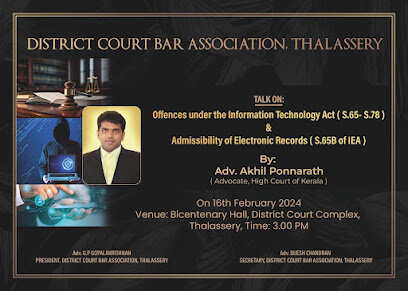Best Criminal Litigation Lawyers in India
Share your needs with us, get contacted by law firms.
Free. Takes 2 min.
Or refine your search by selecting a city:
List of the best lawyers in India
India Criminal Litigation Legal Questions answered by Lawyers
Browse our 1 legal question about Criminal Litigation in India and read the lawyer answers, or ask your own questions for free.
- 377 379 498A and dv
- My wife put allegations on me and my family to police station after seven years of seperation Now police kept calling my and my family for a statement What should i do
-
Lawyer answer by D.H.Associates
Ask the police personnel to share the complaint with you. Reply to the complaint filed by your wife.
Read full answer
About Criminal Litigation Law in India
Criminal litigation in India is a branch of law that deals with crimes and their consequences. It involves a series of legal processes that include investigation, trial, and sentencing of individuals accused of committing crimes. The Indian criminal justice system is governed by the Indian Penal Code (IPC), Code of Criminal Procedure (CrPC), and the Indian Evidence Act. These laws provide a comprehensive framework for handling offenses ranging from minor offences to heinous crimes. The objective of criminal litigation is not only to punish the wrongdoer but also to deter others from committing similar acts and to rehabilitate the convicted individual.
Why You May Need a Lawyer
Involvement in criminal litigation can be daunting and complex. Here are some common situations where you might require legal assistance:
- Being accused of or charged with a criminal offense.
- Victim of a crime seeking justice.
- Navigating investigations by law enforcement agencies.
- Defending against false accusations.
- Negotiating plea bargains or settlements.
- Filing or defending appeals in higher courts.
- Managing implications of the case on your personal and professional life.
- Understanding legal rights and obligations during different stages of litigation.
Local Laws Overview
Several key aspects of local laws are particularly relevant to criminal litigation in India:
- Indian Penal Code (IPC): Defines various offenses and their respective punishments.
- Code of Criminal Procedure (CrPC): Details the procedure for investigation, arrest, bail, charge-sheet filing, trial, and appeal.
- Indian Evidence Act: Governs the admissibility, relevance, and importance of evidence in a trial.
- Juvenile Justice (Care and Protection of Children) Act: Outlines special provisions for cases involving minors.
- Narcotic Drugs and Psychotropic Substances Act: Details offenses relating to drug trafficking and consumption.
Frequently Asked Questions
What is a First Information Report (FIR)?
A First Information Report (FIR) is a written document prepared by the police when they receive information about the commission of a cognizable offense. It is the first step in the criminal justice process and sets the process of criminal litigation in motion.
How can I apply for bail?
To apply for bail, an application must be filed either in the District Court or High Court. The court will consider factors like the nature of the offense, evidence collected, and risk of the accused fleeing or tampering with witnesses.
Are there any alternatives to a continued trial?
Yes, alternative dispute mechanisms like plea bargaining can help in situations where the accused voluntarily pleads guilty for a lesser sentence, reducing the time and resources spent on trials.
What are my rights during an arrest?
Key rights during arrest include the right to remain silent, the right to be informed of charges, the right to legal counsel, and protection against self-incrimination, among others.
How long can an investigation take?
The timeframe for an investigation depends on the complexity of the case and the type of offense. However, excessive delay can be challenged under the right to a speedy trial.
What does 'remand' mean?
Remand refers to the procedure where the accused is kept in custody during the period of investigation and trial. It can be police remand (for investigation purposes) or judicial remand (by court order).
Is my past record relevant in a trial?
An accused's criminal record may be considered in trials as part of sentencing phases to determine appropriate punishment, but it does not directly influence the guilt determination in the current case.
Can minors be tried in a regular criminal court?
No, minors are dealt with under the Juvenile Justice Act which handles cases involving individuals below 18 years of age through a different set of legal protocols.
How can I appeal a court decision?
Appeals can be filed in a higher court, either High Court or Supreme Court, based on dissatisfaction with a trial court's decision. It involves a review of the entire case or specific aspects.
What role does evidence play in a criminal trial?
Evidence is crucial in establishing the facts of a case. It can include documents, witness testimonies, forensic reports, and physical objects, which need to meet specific standards of relevance and admissibility.
Additional Resources
Here are some helpful resources for individuals seeking assistance in criminal litigation:
- National Legal Services Authority (NALSA): Provides free legal services and advice.
- State Legal Services Authority: Offers state-specific legal support and information.
- Lawyers: Certified criminal lawyers and legal advisors can be found through the Bar Council of India.
- Indian Police and Judiciary Websites: Provide detailed information and status of cases.
- Online Legal Forums and Communities: Platforms for consultation and discussion with legal experts.
Next Steps
If you require legal assistance in criminal litigation, consider the following steps:
- Identify the Need: Determine the exact reason for requiring legal assistance and gather all relevant documents.
- Consult with a Lawyer: Seek a consultation with a certified criminal lawyer to discuss your case.
- Understand Your Rights: Familiarize yourself with your legal rights and obligations in the particular situation.
- Evaluate Options: Based on legal advice, consider different pathways like negotiation, trial, or settlement.
- Proceed with Legal Action: Decide on moving forward with a legal process such as filing a case, initiating a defense, or engaging in mediation.
Lawzana helps you find the best lawyers and law firms in India through a curated and pre-screened list of qualified legal professionals. Our platform offers rankings and detailed profiles of attorneys and law firms, allowing you to compare based on practice areas, including Criminal Litigation, experience, and client feedback.
Each profile includes a description of the firm's areas of practice, client reviews, team members and partners, year of establishment, spoken languages, office locations, contact information, social media presence, and any published articles or resources. Most firms on our platform speak English and are experienced in both local and international legal matters.
Get a quote from top-rated law firms in India — quickly, securely, and without unnecessary hassle.
Disclaimer:
The information provided on this page is for general informational purposes only and does not constitute legal advice. While we strive to ensure the accuracy and relevance of the content, legal information may change over time, and interpretations of the law can vary. You should always consult with a qualified legal professional for advice specific to your situation.
We disclaim all liability for actions taken or not taken based on the content of this page. If you believe any information is incorrect or outdated, please contact us, and we will review and update it where appropriate.
Browse criminal litigation law firms by city in India
Refine your search by selecting a city.

















